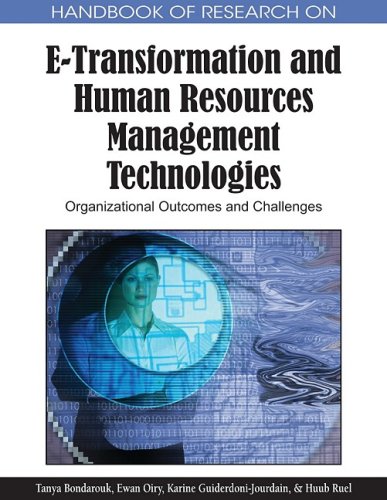Tanya Bondarouk, Tanya Bondarouk, Huub Ruël, Karine Guiderdoni-jourdain, Ewan Oiry9781605663043, 1605663042, 9781605663050, 1605663050
The Handbook of Research on E-Transformation and Human Resources Management Technologies: Organizational Outcomes and Challenges provides practical, situated, and unique knowledge on innovative e-HRM technologies that add competitive advantage to organizations. This Handbook of Research expands on theoretical conceptualizations of e-HRM useful to researchers, academicians, and human resource managers.
Table of contents :
Title……Page 2
Editorial Advisory Board……Page 5
List of Contributors……Page 7
Table of Contents……Page 9
Detailed Table of Contents……Page 14
Preface……Page 23
Making Sense of e-HRM:Transformation, Technology and Power Relations……Page 32
HR Portal: A Tool for Contingent and Individualized HRM……Page 51
E-Work and Labor Processes Transformation……Page 65
Early User Involvement and Participation in Employee Self-Service Application Deployment: Theory and Evidence from Four Dutch Governmental Cases……Page 87
Does User Centered Design, Coherent with Global Corporate Strategy, Encourage Development of Human Resource Intranet Use?……Page 109
In-House vs. Off-the-Shelf e-HRM Applications……Page 123
Adaptive Municipal Electronic Forms……Page 147
HRIS Project Teams Skills and Knowledge: A Human Capital Analysis……Page 166
IT-Based Integration of HRM in a Foreign MNC Subsidiary: A Micro-Political Perspective……Page 184
Studying Human Resource Information Systems Implementation using Adaptive Structuration Theory: The Case of an HRIS Implementation at Dow Chemical Company……Page 202
Applicant Information and Selection Strategies in Corporate Web Site Recruiting: The Role of National Culture……Page 218
What is the Potential of E-Recruitment to Transform the Recruitment Process and the Role of the Resourcing Team?……Page 233
The Role of National Culture on E-Recruitment in India and Mexico……Page 249
Modeling Human Resources in the Emergent Organization……Page 263
Utilizing the Lead User Method for Promoting Innovation in E-Recruiting……Page 283
What Makes the Difference? Introducing an Integrated Information System Architecture for Employer Branding and Recruiting……Page 306
The Enrichment of the HR Intranet Linked to the Regulation’s Processes Between HR Actors……Page 320
Exploring Perceptions about the use of e-HRM Tools in Medium Sized Organizations……Page 335
Perceived Performance of the Human Resources Information Systems (HRIS) and Perceived Performance of the Management of Human Resources (HRM)……Page 355
Employee Life-Cycle Process Management Improvement with Web-Enabled Workflow Systems……Page 366
Information Technologies’ Impact on Individual Learning Process: The Case of a Community of Practice……Page 383
What are the Main Impacts of Internet and Information and Communication Technology on Unions and Trade Unionism? An Exploratory Research in Europe and North America……Page 396
Coordination of Virtual Teams: From Trust to Control……Page 414
Information Overload in the New World of Work: Qualitative Study into the Reasons and Countermeasures……Page 427
HR Shared Service Centers: From Brand Management Towards Success……Page 450
Compilation of References……Page 466
About the Contributors……Page 507
Index……Page 516

Reviews
There are no reviews yet.